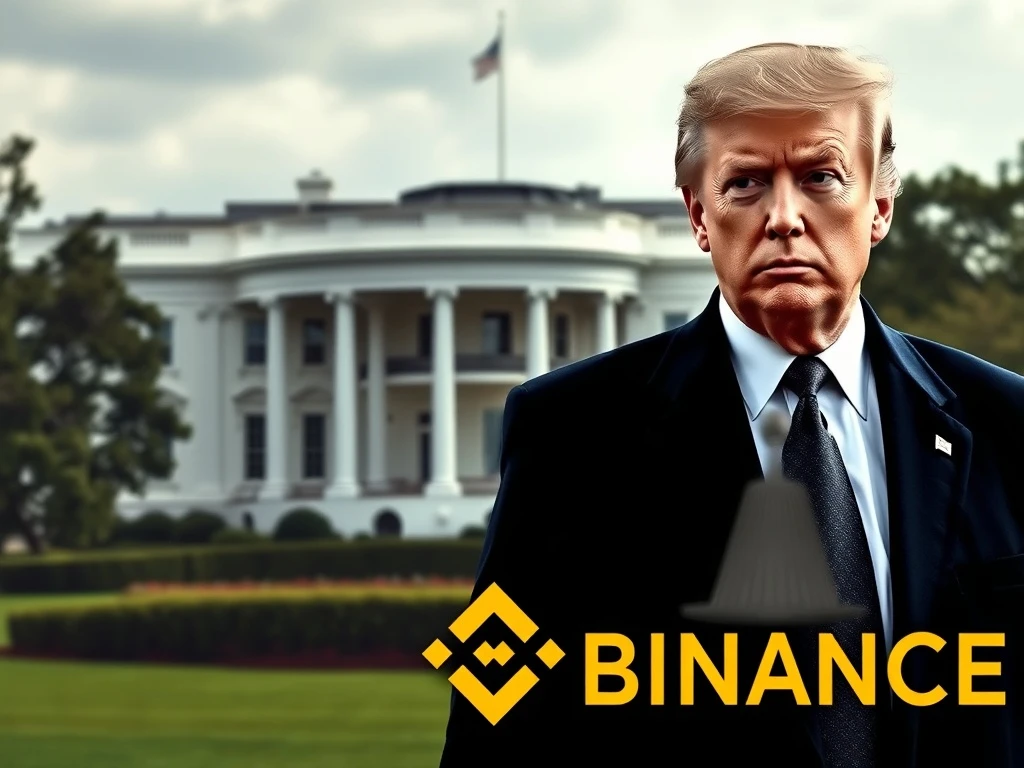CZ Pardon Controversy: Unveiling Binance’s Astounding Washington Lobbying Push

The recent **CZ pardon** by former President Donald Trump has ignited a firestorm of debate. This decision, affecting Changpeng ‘CZ’ Zhao, the former CEO of Binance, reportedly followed a significant and costly **Binance lobbying** campaign in Washington. The revelations, detailed by Politico, highlight extensive efforts to influence key figures within Trump’s circle. Many observers now question the transparency and ethical implications of such high-stakes political maneuvering within the **crypto** industry. This article delves into the specifics of these lobbying efforts and their potential impact on **cryptocurrency regulation**.
Unpacking Binance’s Extensive Lobbying Efforts
Binance, one of the world’s largest cryptocurrency exchanges, engaged in a months-long, expensive lobbying campaign. This effort aimed to secure “executive relief” for its former CEO, CZ. Zhao had previously served a four-month prison sentence for violating US Anti-Money Laundering (AML) laws. According to a Sunday report from Politico, the campaign involved substantial financial commitments to various influential figures.
- In late September, Binance reportedly hired Ches McDowell, a close associate of Donald Trump Jr.
- McDowell’s firm, Checkmate Government Relations, received a substantial $450,000 for just one month’s work.
- Checkmate, known as one of Washington’s fastest-growing firms, reported revenues of $7.1 million in the last three months alone.
This strategic engagement underscores the company’s determination to navigate complex legal and political landscapes. It also highlights the significant resources Binance was willing to deploy. The focus of these efforts was primarily the White House and the Treasury Department, indicating a direct aim at the highest levels of government.
Key Figures and Financial Commitments in the Trump Crypto Era
Beyond the direct payments to Trump-linked lobbyists, Binance and CZ also retained other influential figures. In February, shortly after Trump’s inauguration, they enlisted Teresa Goody Guillén. Guillén is a prominent crypto lawyer who was once considered for the SEC chair role under the Trump administration. Her firm has since earned $290,000 from Binance and Zhao this year alone. This demonstrates a sustained investment in legal and political counsel, especially given her background in financial regulation.
Binance’s recent lobbying is not an isolated incident. The company previously spent over $1 million on lobbying in 2022. It then paused these operations following its 2023 plea deal with US authorities. However, under the current Trump administration, the company has already spent $860,000 on lobbying this year. Furthermore, Binance has expanded its presence through strategic partnerships. One notable collaboration is with the Trump-linked World Liberty Financial venture. This alliance raises questions about the intersection of political influence and financial interests in the burgeoning **Trump crypto** landscape.
Regulatory Implications and Political Backlash Over AML Laws
The pardon and the surrounding lobbying efforts have drawn sharp criticism. US Representative Maxine Waters strongly condemned Trump’s decision last week. She labeled it a “massive favor for crypto criminals.” Waters called the move “appalling but unsurprising.” She specifically cited Zhao’s guilty plea to violating US **AML laws**. These laws are fundamental to preventing illicit financial activities and maintaining market integrity. The accusation suggests a direct challenge to established financial regulations.
Trump, however, offered a different perspective. He justified the pardon by stating Zhao “was persecuted by the Biden administration.” He further asserted that “what he did is not even a crime.” This stark contrast in viewpoints highlights the politicization of **cryptocurrency regulation**. Waters also alleged that Zhao’s pardon came after months of lobbying and “funneling billions into Trump’s personal crypto company, World Liberty Financial.” Such allegations, if proven, could have profound implications for public trust in both political processes and the crypto industry.
The Broader Context of CZ’s Pardon
The **CZ pardon** itself, while granting relief to Zhao, does not equate to an acquittal. It simply removes the legal consequences of his conviction. Zhao pleaded guilty to failing to maintain an effective anti-money laundering program at Binance. This violation allowed illicit funds to flow through the exchange for years. The pardon’s timing, following extensive lobbying, suggests a transactional relationship between political power and financial influence. This situation raises critical questions about the future of accountability in the digital asset space.
Many industry experts and policymakers are now scrutinizing the implications. They ponder how such pardons might affect the enforcement of **AML laws** and broader **cryptocurrency regulation**. The episode could set a precedent for how powerful individuals and entities navigate legal challenges in the crypto world. It also casts a shadow on efforts to legitimize the digital asset market. The public, too, watches closely, wondering about fairness and justice in a rapidly evolving financial landscape.
Conclusion: Navigating Future Cryptocurrency Regulation
The controversy surrounding CZ’s pardon and Binance’s lobbying efforts highlights a critical juncture for the cryptocurrency industry. The extensive financial commitments made by Binance underscore the high stakes involved in regulatory compliance and executive clemency. As the digital asset market matures, the interplay between political influence, legal frameworks, and public perception will only grow more complex. This incident serves as a stark reminder of the challenges ahead in establishing robust and equitable **cryptocurrency regulation**. It also emphasizes the need for transparency in political dealings related to the **crypto** sector. The long-term effects of this pardon on market trust and regulatory enforcement remain to be seen.









